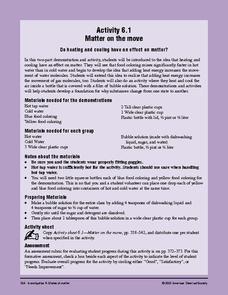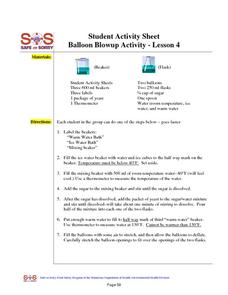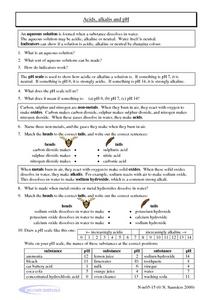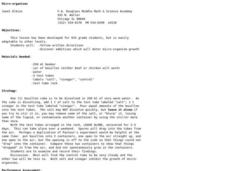Curated OER
Gas Exchange And Respiratory Systems.
Explore structures within the realm of gas exchange in terrestrial and aquatic life. The excellent, labelled diagrams and clear descriptions help your students view the different structures and adaptations that have developed. The 29...
California Academy of Science
Fish Prints
What do a dead fish, conservation, and paint have in common? The answer is a great lesson plan about fish anatomy, fun print making techniques, and unsustainable fishing practices. The class will start by making fish prints with a...
American Chemical Society
Matter on the Move
Start this mini unit on matter out by demonstrating how food coloring behaves when placed in cold and in hot water. Then have the class experiment with warm water and soap film. Pupils will learn that an increase in thermal energy also...
It's About Time
More Chemical Changes
Generate entertainment by assisting students in creating multiple chemical changes during the course of small experiments integrated into one packed lesson. Individuals observe examples of chemical changes as they occur and gather data...
American Chemical Society
Chemical Reactions and Engineering Design
Construction leads to habitat loss and local wildlife suffers. Scholars must build a reptile egg incubation device that meets many constraints. Various experiments help them discover the chemical reaction needed to reach the proper...
Texas Instruments
Endothermic and Exothermic Processes
Students investigate temperature using the TI. In this chemistry lesson, students analyze the change in temperature, as chemicals are dissolved in water. They analyze data collected using the CBL 2.
Curated OER
Water Quality Monitoring
Students comprehend the four parameters of water quality. They perform tests for salinity, dissolved oxygen, pH and clarity or turbidity. Students comprehend why scientists and environmental managers monitor water uality and aquatic...
Curated OER
Fishkill
Students analyze data to determine the effect of thermal pollution on a certain species of fish. They graph temperature and dissolved oxygen and make inferences on the impact a change in temperature could have on the fish. As a class...
Curated OER
Science: Headline
Students are able to identify questions they need to answer to comprehend a specific news article. They are pushed to question how they know that their drinking water is safe.
Curated OER
Water Quality Survey: Monitoring the Sustainability of Pigeon Creek
High schoolers research the History of Pigeon Creek (or any watershed in your area). In this environmental science lesson, students conduct field tests such as pH and nitrates. They collect data and compare what they collected with other...
Curated OER
Where's the Oxygen?
Students study seawater and how temperature and salinity influence it. In this oxygen lesson students complete a lab activity on dissolved oxygen.
Curated OER
Oxygen Levels and Aquatic Plants and Animals
Learners design an experiment to test the effects of a change in the amount of dissolved oxygen of water on aquatic plants and animals. Questions are offered for exploration and experiment design. Results are tabulated and conclusions...
Curated OER
Testing Water Quality
In this science worksheet, students test the quality of water taken from a local source and test it in a lab for the ingredients present.
Curated OER
Water Quality
Students use a microcomputer connected to a conductivity probe to measure the total dissolved solids in local area water samples. Students then compare their measurements with others in their class as well as other standard measurements.
Curated OER
Balloon Blowup Activity
In this science activity worksheet, students will work in small groups to observe and record what happens to balloons after they are placed on flasks and immersed into a warm water bath and an ice water bath.
Curated OER
Acids, Alkalis, and pH
In this pH worksheet, high schoolers determine how indicators work and what the pH scale is used for. Students learn what happens when non-metals burn in air and when metal oxides dissolve in water. This worksheet has 10 problems to solve.
Curated OER
Testing the Waters
Students use test kits to measure the level of chlorine, iron, sulfide, and dissolved oxygen in tap (drinking) water and stream water. They post and evaluate the results of these water quality tests.
Curated OER
The Exceptional Nature of Cellulose
Students observe the affects of a substance's composition and structure have on its solubility. In this cellulose lesson plan students compare the amount of energy required to dissolve mono-saccharides with that required to dissolve...
Curated OER
Micro-organisms
Sixth graders explore the world of micro-organisms. In this science lesson plan, 6th graders discover additives which will deter micro-organism growth.
Curated OER
Creek Monitoring
Sixth graders conduct a variety of assessments at a local stream to determine if it is a suitable habitat for salmon. They measure temperature, tubidity, dissolved oxygen, pH levels, bacteria and nutrients. In this unit, 6th graders work...
Curated OER
Activity #13 Changing The Look of Sugar
Students observe what happens when sugar is dissolved in water and when it is heated. They weigh the products after each of the two experiments on a balance scale. Pupils distinguish between physical and chemical changes. Students are...
Curated OER
Rate of Solution
Eighth graders determine the amount of agitation necessary to dissolve various sized sugar particles. This task assess students' abilities to collect, organize, and interpret data, create appropriate graphs, predict future events based...
Alabama Learning Exchange
Is My Water Safe?
Learners discuss what makes their drinking water safe and unsafe. They locate and visit a local tributary and test the water's pH, hardness, dissolved oxygen, and total alkalinity. They compose a summary paragraph about the tests and...
Curated OER
Activity #5 Environmental Effects
Pupils explain the implications of particle theory of The Law of Conservation of Matter for problems of pollution and waste disposal. They describe, in terms of atoms and molecules, what happens to materials when they are dissolved or...

























